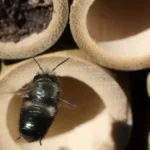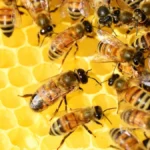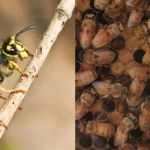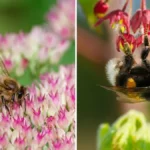Many people are aware that the honeybee and generally all other bee species are in decline globally. Adopting a hive is a way of taking personal capital and introducing it into beekeeping businesses in a way that allows us to invest in bee conservation, and also to get a bit of honey and feel-good feelings.
Have you ever wondered how to adopt a hive in the USA?
Are Honeybees Indigenous To The USA
No. Honeybees are actually an introduced species and in some ways, they have contributed to the decline in indigenous pollinators. This does not mean that honeybees are bad – just that they are maybe not entirely good.
For industrial farming, we really need honeybees – for preserving wild species of flowers, we also need the other bees. Hence we need to encourage honeybees for our food production, and wild bees to keep the ecosystem going.
In this regard, I am going to review bee preservation programs that allow you to adopt a honeybee hive – BUT – also help you to do your bit to preserve indigenous wild bees.
How To Sponsor A Beehive/s
There are a number of different medium-sized and small beekeeping operations that put the time and effort into allowing us to sponsor hives or fund hives, and they provide you with a certificate and normally some of the products of the bees.
Bee Friends Farm
These beekeepers, based in Jacksonville, Florida, have a pleasant bee guardian certificate and depending on which tier you contribute to will determine what you get from your bees. They also provide you with a wildflower seed pack to plant in your garden, or plot that will allow you to do your bit to conserve wild bees.
Bee Mindful Honey Farms
These Texas-based beekeepers have a great program. Here they have two options. You can adopt a rescue hive, that will then be hived in the Austin area. Rescue hives often have excellent genetics, so housing these bees and saving them helps beekeepers build up disease-resistant bee stock. You receive a certificate and information pack on what you can do in your area to help wild bees. You also have the option to adopt a hive in the Congo – here honeybees are indigenous, and you can contribute both to the conservation of bees and empowering of people.
The Karma Honey Project
This is an interesting initiative in Puerto Rico. In this area, the rAHB – an Africanized bee – is showing great potential for beekeeping development. Much like in Africa, the rAHB has far greater resistance to diseases than its European Honeybee counterparts. The result is that it is possible to increase colony numbers and reverse declines seen elsewhere.
There is a reason why this project is important – it is developing the capacity to commercially farm rAHB – this allows beekeepers in the US to have a safe spot to visit and learn how to harness the advantages of rAHB. With time this will probably allow beekeepers in the southern US to eventually transition to farming with the more robust and disease-resistant rAHB bees instead of the disease-prone European Honeybees currently being used commercially.
Operation Honeybee
This project looks at helping you adopt a hive in the Carolinas, Michigan, and Florida. You get to have a label placed on the hive you adopt and get a picture and some hive products. The interesting thing about this project is that the hives are not fed sugars or sugar syrups – these are stand-alone hives that survive on their own resources. In this way, the pressure placed on the hives is a bit less, and this may help to prevent colony collapse disorder.
A problem with this project is that it does nothing to help look after indigenous bees, but, you can always adopt a hive and then buy yourself a wild bee nest to provide a habitat for solitary bees in your area.

Ok, so now we know how to adopt bees and help wild bees. This brings us to a few more interesting questions about bees.
How Do You Import Bees To The USA?
The USA allows the importation of bees from Canada and New Zealand. There is a considerable amount of paperwork involved. You can also sometimes get a permit to allow the importation of bees from other countries. An example was the importation of the so-called Russian bees in the 1990s. This is a significant paperwork exercise. Read more here.

What Licenses Do You Need To Keep Bees?
Generally, most states do not require a license. Sometimes, well in most cases, you are required to register as a beekeeper in your state and this allows the authorities to inspect your hives if they need to.
Here is a general list of the paperwork and inspection requirements for each state.
What You Can Do To Preserve Pollinators
Naturally adopting a hive helps to preserve honeybees. I really would like to encourage you to also place a few solitary bee nesting sites around your garden, on your balcony, and so on. Planting flowers for honeybees is pointless unless you plant an acre of buckwheat or some other heavy nectar source. But planting wildflowers, or excellent nectar sources such as perennial basil can really make a difference to your solitary pollinators.
Solitary pollinators are very entertaining to watch. I spend hours watching leaf cutters and mason bees working away on my basil plants. These bees are just so much more fun to watch than honeybees. I have worked with honeybees for half of my life and love them to bits and pieces. It is however a huge amount of fun to watch these other bees doing their thing too. They all have their own crazy way of dealing with flowers.
I hope this article has helped you see that “Adopt a beehive USA” is not an official program yet – but there are plenty of beekeepers who will help you adopt a hive. Many of these will also help you work to conserve the important indigenous bees as well. If you enjoyed this article please share.
Bee Hive Adoption FAQs
What Does It Mean to Adopt a Beehive?
Adopting a beehive means sponsoring a hive managed by professional beekeepers. You support bee conservation, receive updates about the hive, and often get honey as a reward.
How Can I Adopt a Hive in the USA?
You can adopt a hive through various beekeeping programs, such as Bee Friends Farm, Bee Mindful Honey Farms, and Operation Honeybee. These programs offer different levels of sponsorship and benefits.
What Are the Benefits of Adopting a Hive?
Adopting a hive helps fund bee conservation, supports local beekeepers, and provides you with honey and other hive products. It also offers the satisfaction of contributing to environmental sustainability.
Is Adopting a Hive Good for the Environment?
Yes, adopting a hive supports the health of honeybee populations, which are essential pollinators for many crops. It can also encourage planting of wildflowers to help other pollinators thrive.
Do I Get Honey When I Adopt a Beehive?
Most hive adoption programs include honey as a reward for your sponsorship. The amount of honey you receive often depends on the level of your adoption package.
Can I Adopt a Hive in a Different State?
Yes, many programs allow you to adopt a hive in a state other than your own. You’ll receive updates and sometimes photos of your hive, even if it’s located far from where you live.
How Much Does It Cost to Adopt a Hive?
The cost of adopting a hive varies depending on the program and the level of sponsorship. Typically, it ranges from $50 to $500 per year, depending on the benefits included.
Can Adopting a Hive Help Indigenous Bees?
Indirectly, yes. While most hive adoption programs focus on honeybees, they often include initiatives like planting wildflowers, which can benefit native pollinators as well.
Is Adopting a Hive Tax Deductible?
Some beekeeping organizations are non-profits, meaning your hive adoption could be tax-deductible. Check with the specific program for details on tax benefits.
How Long Does a Hive Adoption Last?
Most hive adoptions last for a year, but many programs offer renewal options. This allows you to continue supporting bee conservation and receive hive updates annually.

Dr. Garth A. Cambray is a Canadian/South African entrepreneur and beekeeper with 28 years of experience in apiculture and specializes in adding value to honey. His Ph.D. research developed a new advanced continuous fermentation method for making mead that has resulted in a number of companies globally being able to access markets for mead. His company, Makana Meadery, exports honey mead to the USA where it is available to discerning connoisseurs. He has also developed technologies to commercially manufacture organic honey vinegar in Zambia for export globally. He holds a few patents globally in the ethanol industry and believes in technology and knowledge transfer for human development and environmental sustainability. One of his proudest achievements is the fact that the wind farm he started at one of his old apiary sites has essentially made his hometown carbon neutral.






